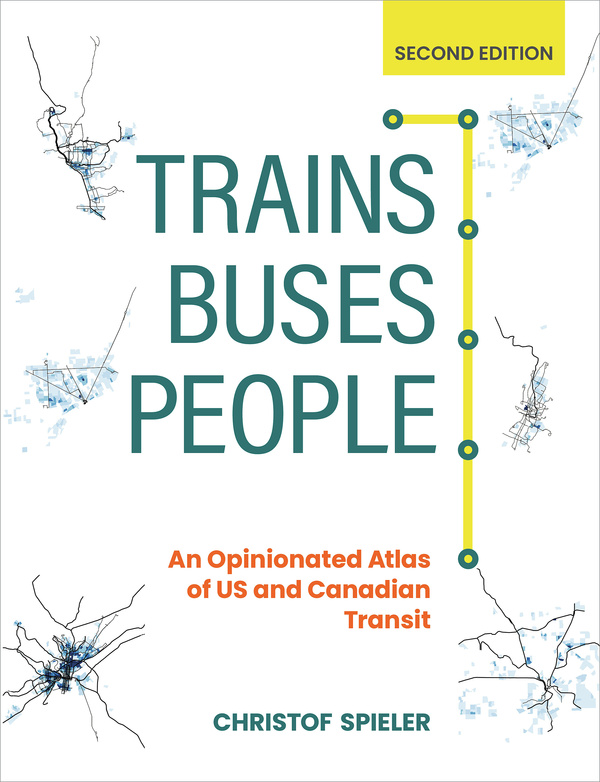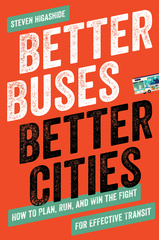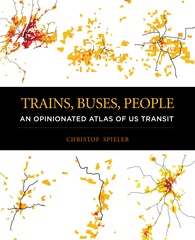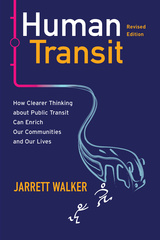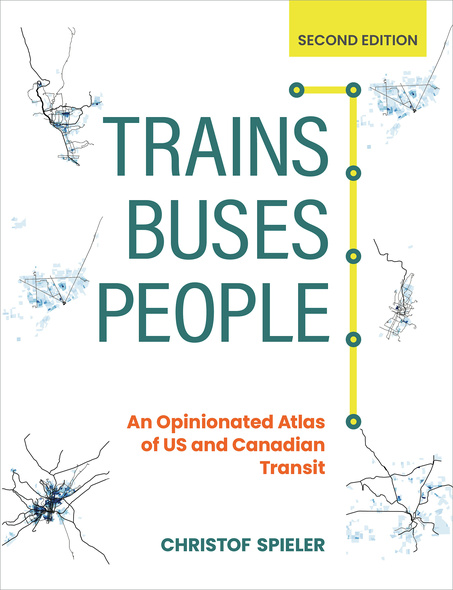
344 pages, 8 1/4 x 10 3/4
340 color photos, 500 color illustrations
Paperback
Release Date:24 Aug 2021
ISBN:9781642832136
Trains, Buses, People, Second Edition
An Opinionated Atlas of US and Canadian Transit
Island Press
“Gets right to the point: put [transit] where the people are...The author combines detailed knowledge and a refreshing frankness...Keep this book within easy reach.”
-Planning
In some US and Canadian cities, transit has quietly been expanding and improving over the last few years, despite funding and ridership challenges. How do we assess the advances and failures of our current systems to move forward strategically and wisely?
The first edition of Trains, Buses, People was dubbed “a transit wonk’s bible” and guided “a smarter conversation about urban transit” in the US. This second edition is fully updated and expanded to include eight Canadian cities and two new US cities (Indianapolis and San Juan, Puerto Rico).
In Trains, Buses, People, Second Edition: An Opinionated Atlas of US and Canadian Transit, transit expert and “transportation hero” Christof Spieler provides a new section on inclusivity to help agencies understand how to welcome riders regardless of race, gender, income, or disability. Select cities include new maps overlaying transit and poverty data, and systems that have started construction since the first edition in 2018 have been added. Other new sections address network typologies, guideway types, station types, and fares.
Spieler has spent over a decade advocating for transit as a writer, community leader, urban planner, transit board member, and enthusiast. He strongly believes that just about anyone—regardless of training or experience—can identify what makes good transit with the right information. In the fun, accessible, and visually appealing Trains, Buses, People, Second Edition: An Opinionated Atlas of US and Canadian Transit, Spieler shows how cities can build successful transit. He profiles the 49 metropolitan areas in the US and eight metropolitan areas in Canada that have rail transit or BRT, using data, photos, and maps for easy comparison. Spieler ranks the best and worst systems and he offers analysis of how geography, politics, and history complicate transit planning. He shows how the unique circumstances of every city have resulted in very different transit systems.
Trains, Buses, People, Second Edition is intended for non-experts—it will help any citizen, professional, or policymaker with a vested interest evaluate a transit proposal and understand what makes transit effective. It shows that it is possible, with the right tools, to build good transit.
-Planning
In some US and Canadian cities, transit has quietly been expanding and improving over the last few years, despite funding and ridership challenges. How do we assess the advances and failures of our current systems to move forward strategically and wisely?
The first edition of Trains, Buses, People was dubbed “a transit wonk’s bible” and guided “a smarter conversation about urban transit” in the US. This second edition is fully updated and expanded to include eight Canadian cities and two new US cities (Indianapolis and San Juan, Puerto Rico).
In Trains, Buses, People, Second Edition: An Opinionated Atlas of US and Canadian Transit, transit expert and “transportation hero” Christof Spieler provides a new section on inclusivity to help agencies understand how to welcome riders regardless of race, gender, income, or disability. Select cities include new maps overlaying transit and poverty data, and systems that have started construction since the first edition in 2018 have been added. Other new sections address network typologies, guideway types, station types, and fares.
Spieler has spent over a decade advocating for transit as a writer, community leader, urban planner, transit board member, and enthusiast. He strongly believes that just about anyone—regardless of training or experience—can identify what makes good transit with the right information. In the fun, accessible, and visually appealing Trains, Buses, People, Second Edition: An Opinionated Atlas of US and Canadian Transit, Spieler shows how cities can build successful transit. He profiles the 49 metropolitan areas in the US and eight metropolitan areas in Canada that have rail transit or BRT, using data, photos, and maps for easy comparison. Spieler ranks the best and worst systems and he offers analysis of how geography, politics, and history complicate transit planning. He shows how the unique circumstances of every city have resulted in very different transit systems.
Trains, Buses, People, Second Edition is intended for non-experts—it will help any citizen, professional, or policymaker with a vested interest evaluate a transit proposal and understand what makes transit effective. It shows that it is possible, with the right tools, to build good transit.
For all of their hardcore infrastructure, urban transit networks are essentially human creations, and understanding what makes them successful is essential for building successful cities. Supported by urban histories and incisively presented data, Christof Spieler sets the rules of engagement for effective transit and offers a roadmap for achieving it.
Christof Spieler was the driving force behind Houston's transit transformation, but he's also one of America's great transit travelers, a careful observer of history, technology, geometry, and politics. This book is an atlas of beautiful detail about 47 U.S. cities, but it's also a call to action, demanding clearer and more effective transit planning and advocacy.
This book is comprehensive enough to be a resource for transit professionals, but delivered in readable, straightforward language; an objective look at the state of transit by a passionate advocate.
Climate change demands a rapid shift to low-emission transportation, which won’t happen if we don’t get transit right to start with. Spieler’s atlas is thus ‘opinionated’ and timely.
Expertly written, thoroughly 'user friendly' in commentary tone, organization and presentation, this new second edition of Trains, Buses, People: An Opinionated Atlas of US and Canadian Transit is especially and unreservedly recommended for personal, professional, community, college and university library Travel collections.
For all of their hardcore infrastructure, urban transit networks are essentially human creations, and understanding what makes them successful is essential for building successful cities. Supported by urban histories and incisively presented data, Christof Spieler sets the rules of engagement for effective transit and offers a roadmap for achieving it.
Christof Spieler was the driving force behind Houston's transit transformation, but he's also one of America's great transit travelers, a careful observer of history, technology, geometry, and politics. This book is an atlas of beautiful detail about 47 U.S. cities, but it's also a call to action, demanding clearer and more effective transit planning and advocacy.
This book is comprehensive enough to be a resource for transit professionals, but delivered in readable, straightforward language; an objective look at the state of transit by a passionate advocate.
Christof Spieler, PE, AICP, LEED AP, is a Vice President and Director of Planning at Huitt-Zollars and a Lecturer in Architecture and Engineering at Rice University. He was a member of the board of directors of Houston METRO from 2010 to 2018.
Acknowledgments
Introduction: Transit Where the People Are
What Transit Does Well
Why We Get It Wrong
PART 1: How Transit Works
The History of Transit
Drawing a Line
Networks
Modes
Guideways
Stations
Fares
Governance
Funding
Riders and Destinations
Hopes and Fears
PART 2: Basics of Successful Transit
Density
Activity
Walkability
Connectivity
Frequency
Travel Time
Reliability
Capacity
Legibility
Inclusivity
Good Ideas from Abroad
PART 3: Metro Areas
The Best and the Worst
Intercity Rail
The 57 Metro Areas in the United States and Canada that have rail transit or BRT
Conclusion: A Transit Agenda
Index
Introduction: Transit Where the People Are
What Transit Does Well
Why We Get It Wrong
PART 1: How Transit Works
The History of Transit
Drawing a Line
Networks
Modes
Guideways
Stations
Fares
Governance
Funding
Riders and Destinations
Hopes and Fears
PART 2: Basics of Successful Transit
Density
Activity
Walkability
Connectivity
Frequency
Travel Time
Reliability
Capacity
Legibility
Inclusivity
Good Ideas from Abroad
PART 3: Metro Areas
The Best and the Worst
Intercity Rail
The 57 Metro Areas in the United States and Canada that have rail transit or BRT
Conclusion: A Transit Agenda
Index

